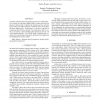410 search results - page 36 / 82 » Incremental Construction of Structured Hidden Markov Models |
131
Voted
AGENTS
1997
Springer
15 years 5 months ago
1997
Springer
The coordination problem in multi-agent systems is the problem of managing dependencies between the activities of autonomous agents, in conditions of incomplete knowledge about th...
115
Voted
AIEDU
2005
15 years 27 days ago
2005
The Bayesian framework offers a number of techniques for inferring an individual's knowledge state from evidence of mastery of concepts or skills. A typical application where ...
CORR
2010
Springer
15 years 1 months ago
2010
Springer
We focus on credal nets, which are graphical models that generalise Bayesian nets to imprecise probability. We replace the notion of strong independence commonly used in credal ne...
103
click to vote
ICASSP
2009
IEEE
15 years 7 months ago
2009
IEEE
In modern automatic speech recognition systems, it is standard practice to cluster several logical hidden Markov model states into one physical, clustered state. Typically, the cl...
111
Voted
MICCAI
2003
Springer
16 years 1 months ago
2003
Springer
We present a new brain segmentation framework which we apply to T1-weighted magnetic resonance image segmentation. The innovation of the algorithm in comparison to the state-of-the...

